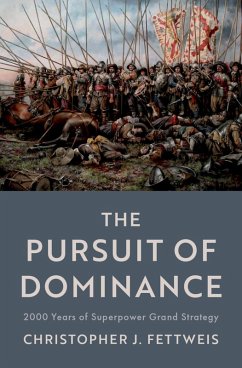
The Pursuit of Dominance (eBook, ePUB)
2000 Years of Superpower Grand Strategy
Versandkostenfrei!
Sofort per Download lieferbar
11,95 €
inkl. MwSt.
Weitere Ausgaben:

PAYBACK Punkte
6 °P sammeln!
A sweeping yet concise account of history's empires that managed to maintain dominance for long stretches. What should the United States do with its power? What goals should it have, and how should it pursue them? Ultimately, what do Americans want their country to be? These are questions of grand strategy. The United States is the most powerful actor in the international system, but it is facing a set of challenges that might lead to its decline as this century unfolds. In The Pursuit of Dominance, Christopher J. Fettweis examines the grand strategy of previous superpowers to see how they mai...
A sweeping yet concise account of history's empires that managed to maintain dominance for long stretches. What should the United States do with its power? What goals should it have, and how should it pursue them? Ultimately, what do Americans want their country to be? These are questions of grand strategy. The United States is the most powerful actor in the international system, but it is facing a set of challenges that might lead to its decline as this century unfolds. In The Pursuit of Dominance, Christopher J. Fettweis examines the grand strategy of previous superpowers to see how they maintained, or failed to maintain, their status. Over the course of six cases, from Ancient Rome to the British Empire, he seeks guidance from the past for present US policymakers. Like the United States, the examples Fettweis uses were the world' strongest powers at particularly moments in time, and they were hoping to stay that way. Rather than focusing on those powers' rise or how they ruled, however, Fettweis looks at how they sought to maintain their power. From these cases, one paramount lesson becomes clear: Dominant powers usually survive even the most incompetent leaders. Fettweis is most interested in how these superpowers defined their interests, the grand strategies these regimes followed to maintain superiority over their rivals, and how the practice of that strategy worked. A sweeping history of grand strategy, The Pursuit of Dominance looks at the past 2,000 years to highlight what--if anything--current US strategists can learn from the experience of earlier superpowers.
Dieser Download kann aus rechtlichen Gründen nur mit Rechnungsadresse in A, B, BG, CY, CZ, D, DK, EW, E, FIN, F, GR, HR, H, IRL, I, LT, L, LR, M, NL, PL, P, R, S, SLO, SK ausgeliefert werden.













